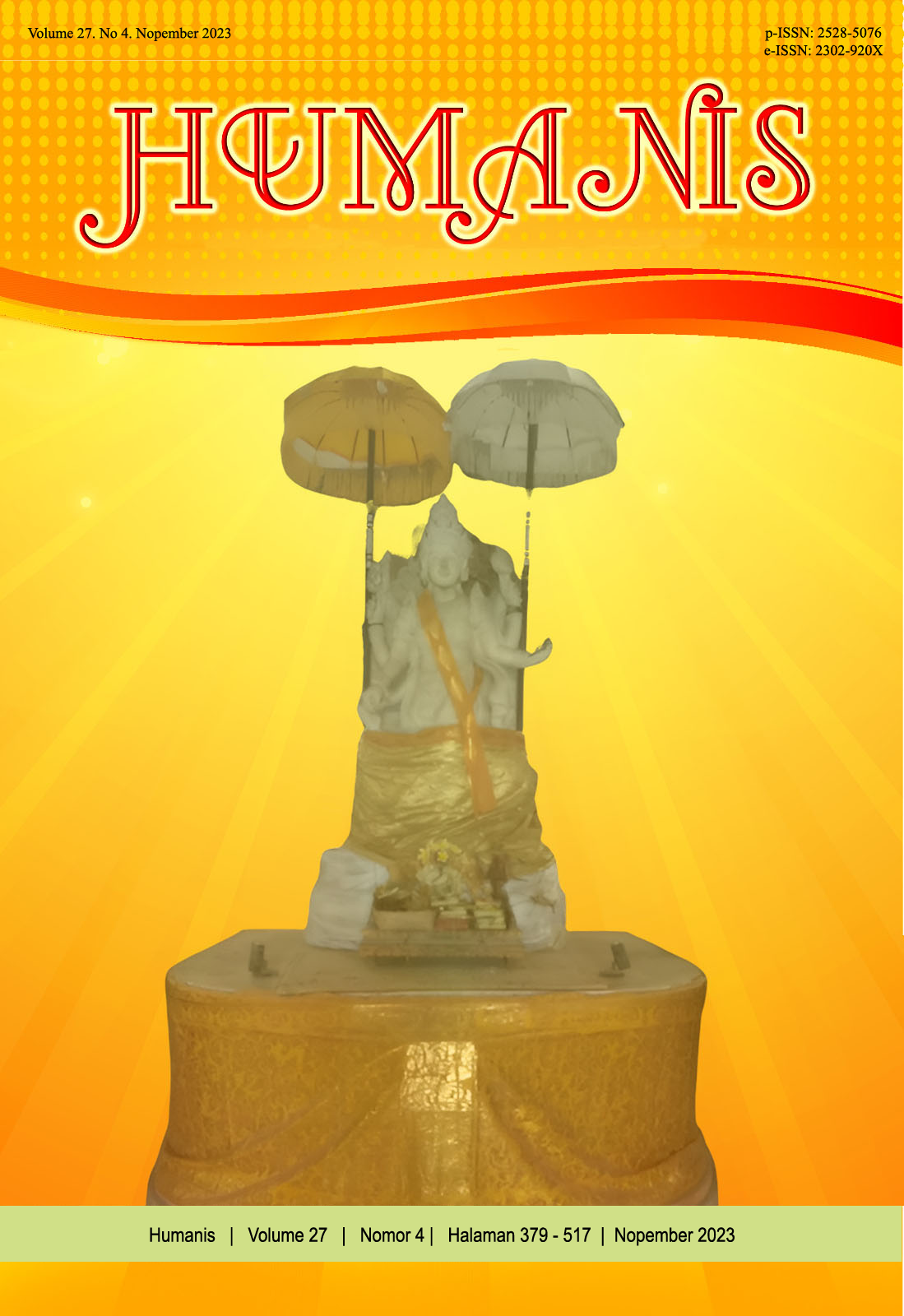Deixis in Conan Gray’s “Wish You Were Sober” and “Checkmate” Song Lyrics
Abstract
In conducting communication, deixis becomes a significant concern for people in improving their understanding of utterance usage. By learning deixis well, listeners can avoid misinterpretation in understanding the context of utterances, one of them while listening to the songs. Based on this phenomenon, this article aimed at identifying the types of deixis and analyzing the reference meaning of deixis used in Conan Gray’s “Wish You Were Sober” and “Checkmate” song lyrics. This article dealt with the qualitative method, while the documentation method was applied in collecting the data. The collected data were analyzed based on the deixis theory proposed by Cruse and the context of the situation developed by Holmes. The results showed the use of all types of deixis, namely the person, spatial, temporal, social, and discourse deixis. These types of deixis had reference meanings in pointing to participants involved in the songs, the location of participants, the time reference, the social relationship among the participants, and the prior or future discourse elements found in Conan Gray’s song lyrics.
Downloads
References
Creswell, J. W. & Creswell, J. D. (2018). Research Design: Qualitative, Quantitative, and Mix Methods Approaches 5th ed. Los Angeles: SAGE.
Cruse, A. (2006). Glossary of Semantics and Pragmatics. Edinburgh: Edinburgh University Press.
Cruse, D. A. (2000). Meaning in Language: An Introduction to Semantics and Pragmatics. Oxford University Press, New York
Eggins, S. (2004). An Introduction to Systemic Functional Linguistics 2nd ed. London: Continuum.
Esseili, F. (2008). Working Paper: Spatial Deixis and Gesture in English: Adults vs. Children. English Faculty Publications. 120.
Halliday, M. A. K. & Hasan, R. (1976). Cohesion in English. Longman Group Ltd, London.
Holmes, J. (2013). An Introduction to Sociolinguistics 4th ed. New York: Routledge.
Islam, M. (2020). Data Analysis: Types, Process, Methods, Techniques, and Tools. International Journal on Data Science and Technology, 6(1), 10-15. https://doi.org/10.11648/J.IJDST.20200601.12
Kusumadewi, S. & Anggraeni, A. (2020). An Analysis of Deixis in Pamungkas “One Only” Song Lyrics. PROJECT (Professional Journal of English Education), 3(4), 489-493. https://doi.org/10.22460/project.v3i4.p489-493
Levinson, S.C. (1983). Pragmatics. Cambridge: Cambridge University Press.
Mahasuari, K. N., Widiastuti, N. M. A., & Indrawati, N. L. K. M. (2022). Deixis Found in Joe Biden’s Inauguration Speech. ELYSIAN JOURNAL: English Literature, Linguistics and Translation Studies, 2(2), 148-157.
Minakova, L. Y. & Gural, S. K. (2015). The Situational Context Effect in Non-Language-Majoring EFL Students’ Meaning Comprehension. Procedia - Social and Behavioral Sciences, 200, 62–68. https://doi.org/10.1016/j.sbspro.2015.08.014
Ngulube, P. (2015), Qualitative Data Analysis and Interpretation: Systematic Search for Meaning, in Mathipa, E.R. & Gumbo, M.T. (eds). Addressing Research Challenges: Making Headway for Developing Researchers. Noordywk: Mosala-MASEDI Publishers & Booksellers, 131-156. https://doi.org/10.13140/RG.2.1.1375.7608
Nisa, B., Asi, A. G., & Sari, S. W. (2020). The Context Meaning of Deixis in Soundtracks Lyric of the Greatest Showman Movie. Metathesis: Journal of English Language, Literature, and Teaching, 4(1), 41-55.
Rokhmah, D. E. L. (2022). A Deixis Analysis of Song Lyrics in Jeremy Zucker’s “You Were Good to Me” and “Comethru.” ELS Journal on Interdisciplinary Studies in Humanities, 5(3), 447-452. https://doi.org/10.34050/elsjish.v5i3.21606
Sahusilawane, C., Aritonang, P., Oraile, P., & Lekawael, R. F. J. (2023). A Pragmatic Analysis of Deixis and Reference on Taylor Swift Songs: Anti-hero and Back to December. MATAI: International Journal of Language Education, 3(2), 103-110. https://doi.org/10.30598/matail.v3i2.9144
Sudaryanto, S. (1993). Metode dan Aneka Teknik Analisis Bahasa (Pengantar Penelitian Wahana Kebudayaan Secara Linguistik). Duta Wacana University Press, Yogyakarta.
Yerznkyan, Y. (2009). Deixis as a Significant Element of Human Communication. Armenian Folia Anglistika, 5(1-2 (6)), 172-177. https://doi.org/10.46991/AFA/2009.5.1-2.172
Yule, G. (1996), Pragmatics. New York: Oxford University Press.


















